Discover the Future of Business Development: Unlocking the Power of AI Tools
In a rapidly evolving tech landscape, AI tools for business are the secret sauce to transforming business applications from standard to extraordinary. This article is more than just a read; it’s a guide to revolutionizing your business processes with AI.
You’ve probably pondered questions like, Which AI tools are essential for my business? How can AI streamline my development process? Alan Kay, a computer science pioneer, once said, “The best way to predict the future is to invent it.” This article is your first step in that invention.
The significance of AI in business application development cannot be overstated. Studies, including those by McKinsey, have shown that AI can lead to a significant reduction in process time and an increase in efficiency. AI is not just a competitive edge; it’s becoming a necessity.
With almost 8 years of experience in software engineering and a focus on the latest AI trends, I bring a practical, no-nonsense perspective to this rapidly evolving field. My insights are grounded in real-world application and continuous study.
By reading this article, you’ll have a clear understanding of the top AI tools in the market, how they can benefit your business, and why they are crucial for staying ahead in the fast-paced world of business application development.
| Name | Pricing | Target Audience | Key Features |
| Flatlogic | Custom pricing | Businesses for custom applications | Custom web apps, AI-driven analytics |
| AI-Builder Pro | Subscription-based | Software developers and data scientists | Automated code generation, ML models |
| DataWiz AI | Pay-per-use | Business analysts and project managers | Real-time data analytics, reporting |
| CodeGenius AI | Free basic version; Subscription for premium | Independent developers, startups | AI-assisted coding, error detection |
| TensorFlow.js | Free (Open-source) | Web developers | ML model training in browser |
| Adobe Sensei | Varies with Adobe products | Designers and developers using Adobe | Automation in design, personalization |
| Dialogflow by Google | Free and paid plans | Businesses for conversational AI | Conversational interfaces, NLU |
| IBM Watson | Pay-as-you-go and subscription | Large enterprises | Data analysis, NLP, and ML models |
| Microsoft Azure AI | Pay-as-you-go | Developers and businesses for scalable solutions | Machine Learning, Cognitive Services |
| Salesforce Einstein | Part of the Salesforce platform | Salesforce users | AI for CRM, predictions |
| Blue Prism | Subscription-based | Enterprises for automation | RPA, AI for process optimization |

How to choose the best AI Tools for Business Application Development
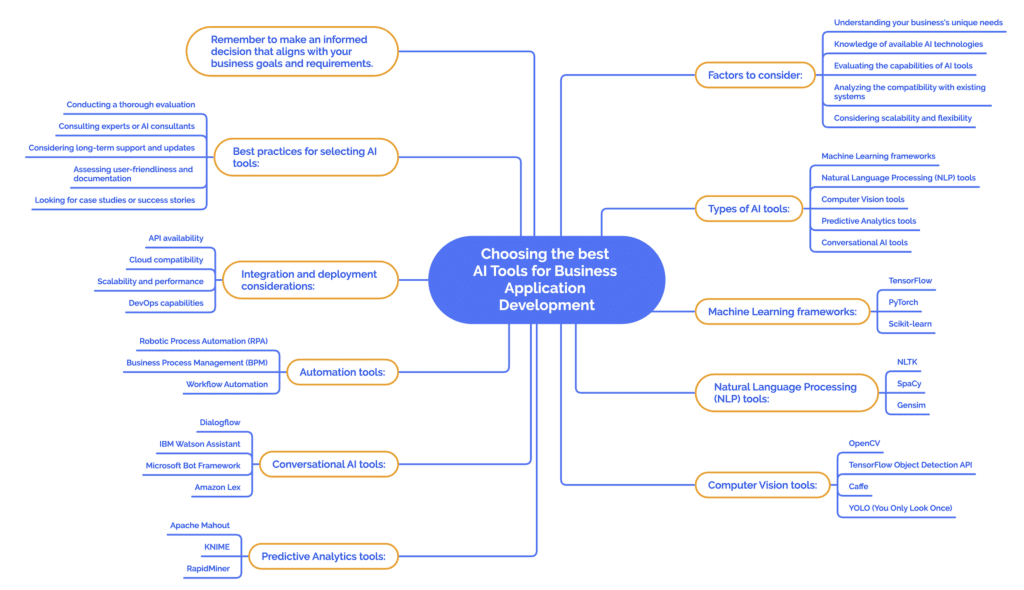
Selecting the ideal AI tools for business application development is a process that depends on a nuanced understanding of your business’s unique needs and the diverse capabilities of available AI technologies. Here’s a list of tips that will help you navigate this selection:
Tip 1. Clarify Your Business Goals.
- Identify Challenges: Start by pinpointing the specific issues or objectives you want to tackle using AI. This could range from streamlining operations to enhancing customer interactions.
- Technical Needs: Think about the technical aspects, like the need for large-scale data handling, compatibility with current systems, and adherence to industry standards.
Tip 2. Explore Varieties of AI Tools
- Explore Machine Learning applications, which are ideal for data-driven tasks like forecasting trends or analyzing customer behavior.
- Explore Natural Language tools, cause these are key for developing intelligent chatbots or enhancing customer communication.
- Take a look for AI tools for developers that can assist in automating coding, testing, and deployment.
- And Data Analytics tools, which are essential for processing and visualizing large datasets effectively.
Tip 3. Assess the Tools Features
- Consider how easy the tool is to learn and use. Your AI tool must work well with your existing technology stack.
- Customization is a huge plus.
Tip 4. Check for Scalability
The tool should be able to grow with your business and adapt to evolving needs.
Tip 5. Security and Legal Compliance
Make sure the tool meets industry-standard security protocols and complies with relevant data protection laws.
Tip 6. Community and Support
A strong support system and an active community can be incredibly helpful.
Tip 7. Weigh Costs Against Benefits
Analyze the tool’s cost relative to the potential return on investment, considering both immediate and long-term impacts.
Tip 8. Test Before Committing
If available, use a trial version to see how the tool performs in your specific environment.
Tip 9. Research User Feedback
Look for insights from other businesses that have used the tool, focusing on those in similar industries.
Tip 10. Vendor’s Track Record
Opt for a vendor known for reliability and continuous support.
Finding the “best” AI tool is less about the tool’s standalone capabilities and more about how well it fits your organization’s specific needs and existing infrastructure. It’s important to conduct thorough research and hands-on testing and to make a choice that balances technical capabilities, cost, ease of use, and ongoing support. Remember, the most sophisticated AI solution may not be the right choice if it doesn’t fit seamlessly into your business landscape.
Best AI Tools for Business Application Development
In the rapidly evolving world of business technology, AI tools for business application development have become critical to driving innovation, efficiency, and competitiveness. Whether it’s improving coding processes, streamlining data analysis, or enhancing customer interactions, AI is at the forefront of modern business application development. This section presents a list of the top AI tools, each designed to meet specific needs in the development process. From individual developers to large enterprises, these tools offer a range of capabilities that target different aspects of application development. I’ve included tools that help with coding, workflow optimization, data handling, and customer engagement to provide a comprehensive view of what the AI technology landscape has to offer. Let’s explore these tools and how they can revolutionize your business application development.
Flatlogic
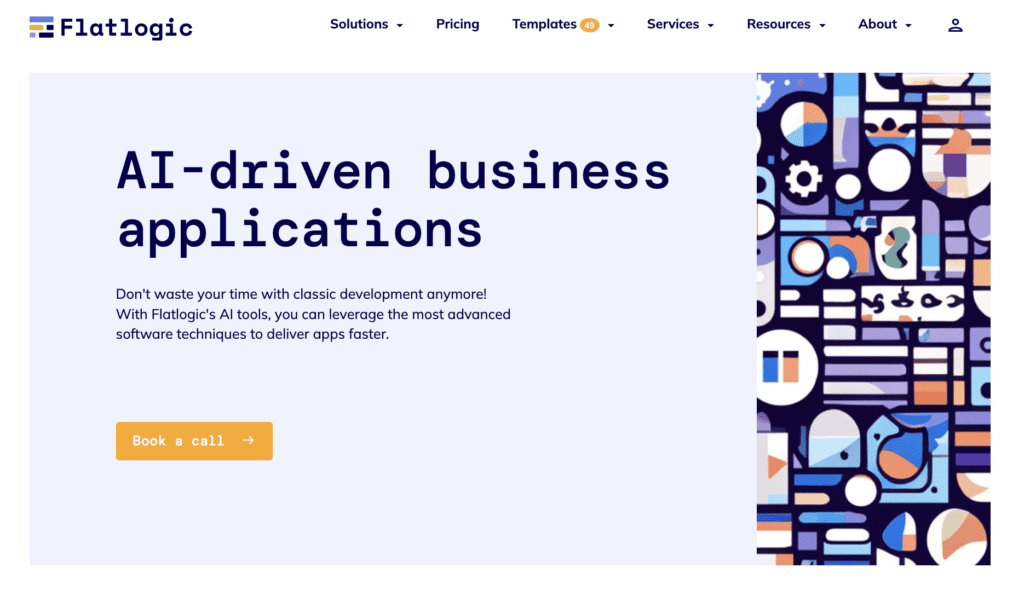
Flatlogic specializes in creating custom web applications with a focus on AI-enhanced ERP, CRM, and CMS systems, providing an end-to-end development environment.
Target Audience: Businesses looking for bespoke application solutions, particularly in Enterprise Resource Planning and Customer Relationship Management.
Top Features: Customizable templates, AI-driven analytics, seamless integration with databases.
Pricing Model: Custom pricing based on project scope and requirements.
Pros:
- Highly customizable to specific business needs.
- Incorporates AI for enhanced data insights.
- Offers full project support, from development to deployment.
Cons:
- Cost may be higher due to customization.
- Requires clear project requirements for best results.
AI-Builder Pro
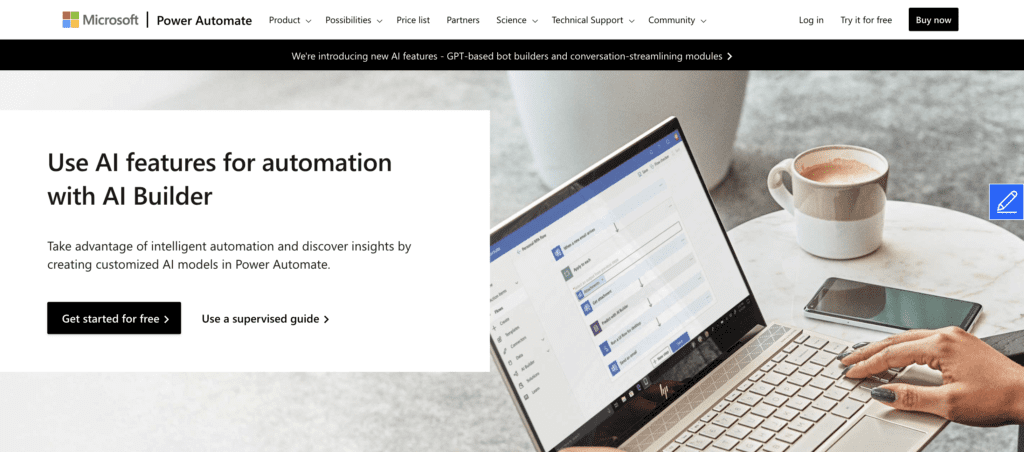
AI-Builder Pro is designed to streamline the development of business applications by automating coding processes and offering advanced data analytics capabilities.
Target Audience: Software developers and data scientists in medium to large enterprises.
Top Features: Automated code generation, integrated machine learning models, and data visualization tools.
Pricing Model: Subscription-based with a free trial, tiered pricing depending on features and scale.
Pros:
- Reduces development time significantly.
- Offers a wide range of integrated ML models.
- User-friendly interface.
Cons:
- The higher learning curve for non-technical users.
- Can be expensive for small businesses.
DataWiz AI
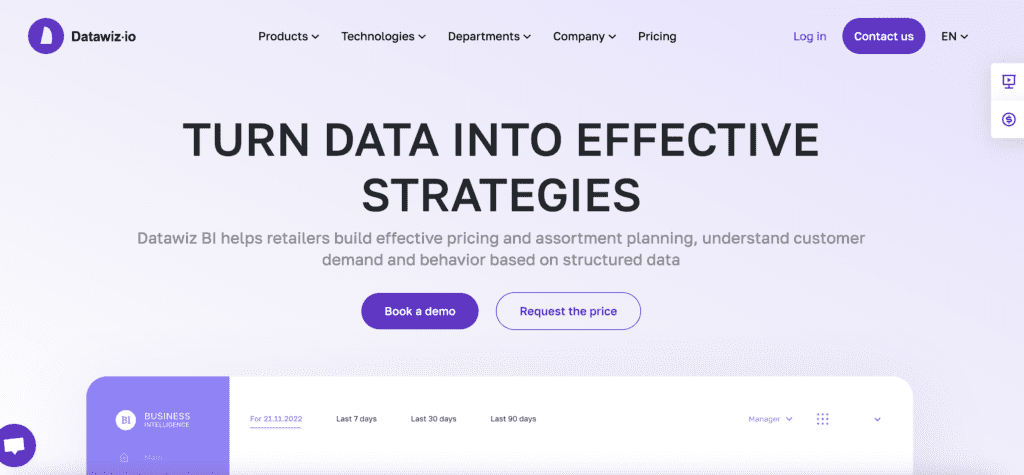
DataWiz AI specializes in providing powerful data analysis and reporting tools, enhancing decision-making in business application development.
Target Audience: Business analysts, project managers, and data-driven enterprises.
Top Features: Real-time data analytics, customizable reporting, AI-driven insights.
Pricing Model: Pay-per-use with a basic free version; premium features are charged.
Pros:
- Excellent for real-time data processing.
- Highly customizable reports.
- Intuitive user interface.
Cons:
- Limited functionality in the free version.
- May require integration with other databases or tools for maximum efficiency.
CodeGenius AI

This tool leverages AI to assist developers in writing more efficient code, debugging, and testing applications.
Target Audience: Independent developers, startups, and agile development teams.
Top Features: AI-assisted coding, error detection, automated testing.
Pricing Model: Free basic version; premium version with advanced features is subscription-based.
Pros:
- Enhances coding efficiency.
- Excellent for rapid prototyping.
- Useful for beginner and intermediate developers.
Cons:
- Advanced features require the premium version.
- May not support all programming languages.
TensorFlow.js
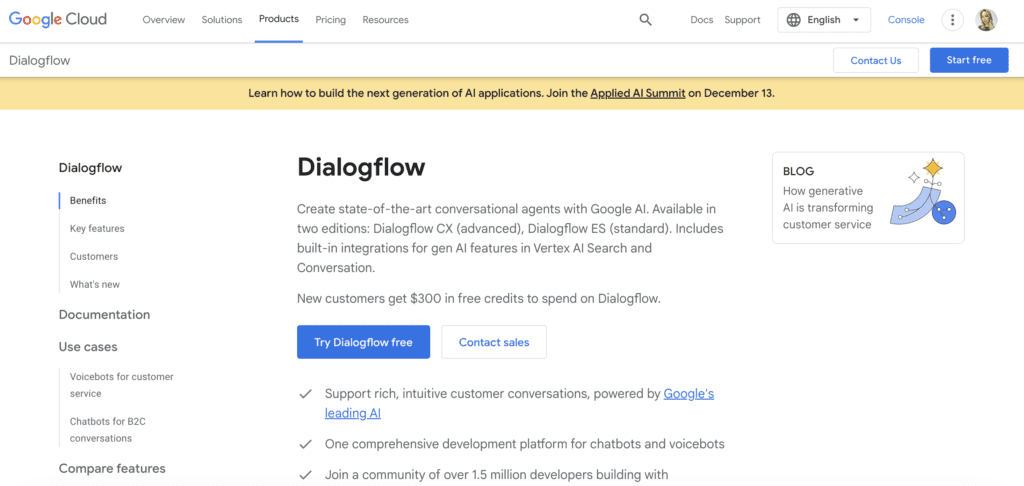
TensorFlow.js provides a powerful, flexible platform for companies that want to integrate machine learning directly into their web applications. It allows ML models to be trained and deployed directly in the browser, enabling interactive, intelligent web applications.
Target Audience: Web developers and businesses seeking to integrate machine learning into their web applications without requiring extensive machine learning expertise.
Key Features:
- Allows for the training and deployment of ML models directly in the browser.
- Provides a flexible and accessible approach to implementing AI.
- Enhances web applications with interactive and intelligent features for improved user engagement.
Pricing: TensorFlow.js is an open-source library, available for free. Costs may be incurred for additional tools or cloud services used in conjunction with TensorFlow.js.
Pros:
- Enables integration and execution of machine learning models directly in web browsers.
- Provides a flexible and accessible way for developers to implement AI without deep knowledge of machine learning.
- Enhances web applications with interactive and intelligent features, improving user engagement.
Cons:
- Running intensive models in the browser can lead to performance issues, especially on less powerful devices.
- Requires some technical expertise in both web development and machine learning concepts.
- Differences in browser capabilities can lead to inconsistent experiences across platforms.
Adobe Sensei
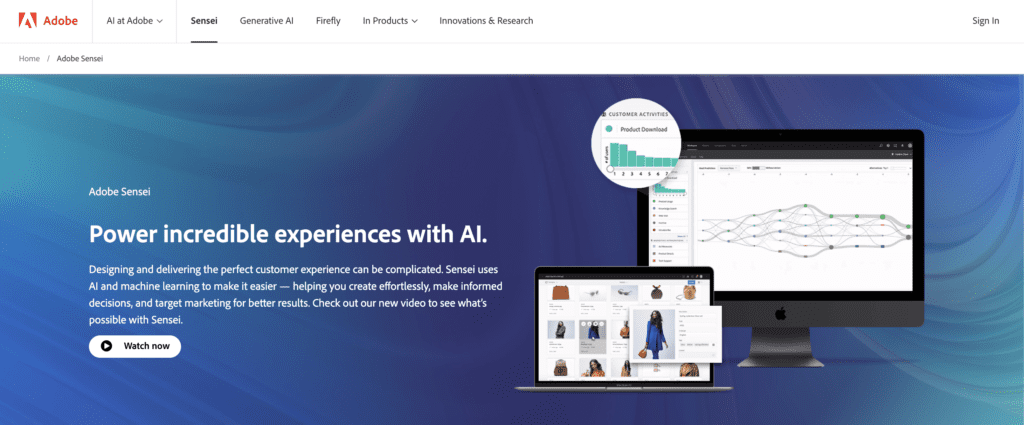
Adobe’s AI and machine learning technology, Adobe Sensei, is integrated into a variety of Adobe products, including web design and development tools. It helps automate mundane tasks, optimize design elements, and deliver personalized experiences to website visitors.
Target Audience: Designers, developers, and businesses already using Adobe’s suite of products, looking to automate and enhance their design and development processes.
Key Features:
- Integrated with various Adobe products, enhancing web design and development.
- Automates routine tasks and optimizes design elements.
- Provides tools for personalized and creative design in web development.
Pricing: Adobe Sensei’s features are integrated into Adobe’s product suite. Pricing varies based on the specific Adobe products and subscription plans chosen.
Pros:
- Automate routine design and development tasks to increase efficiency.
- Provides tools for more personalized and creative design elements in web development.
- Integrates seamlessly with other Adobe products to provide a comprehensive design and development environment.
Cons:
- Best suited for those who already use or are familiar with the Adobe product suite.
- Adobe products can be expensive, especially for small businesses or individual developers.
- Users must become familiar with specific features and best practices within the Adobe ecosystem.
Dialogflow by Google
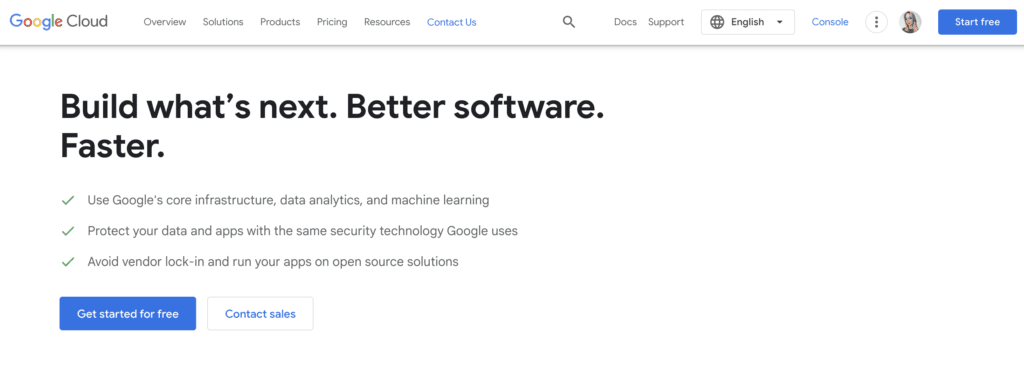
Dialogflow is an AI-powered tool developed by Google, designed to create conversational interfaces for websites, mobile applications, and IoT devices. It excels in building chatbots and voice apps, enhancing customer interaction.
Target Audience: Businesses and developers looking to integrate advanced conversational AI into their applications.
Key Features:
- Natural language understanding to process user inputs.
- Integration with multiple platforms including Google Assistant, Alexa, and Facebook Messenger.
- Tools for building chatbots and voice applications with minimal coding.
Pricing Model: Free and paid plans based on the number of requests and level of complexity.
Pros:
- Enables sophisticated conversational AI applications.
- Extensive platform support for wider reach.
- User-friendly interface for building chatbots and voice assistants.
Cons:
- Can become costly at scale.
- Limited customization options in the free version.
IBM Watson
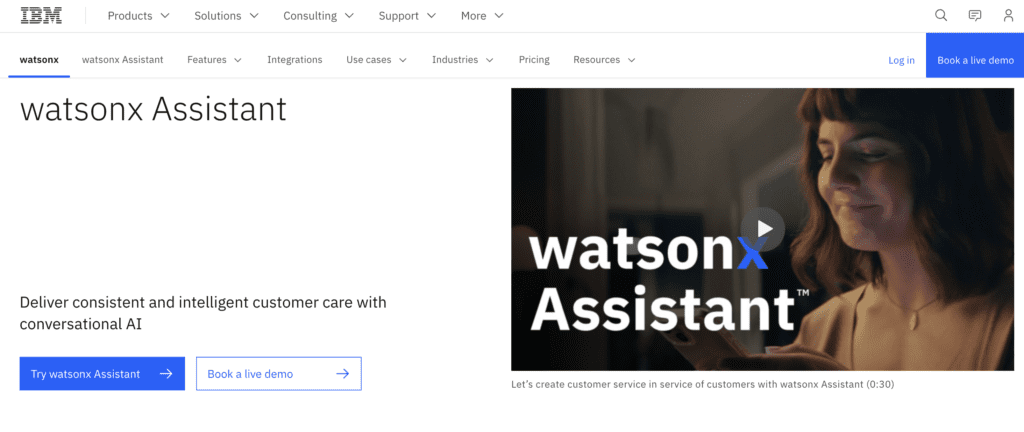
IBM Watson provides a suite of AI services and tools, known for its powerful data analysis, natural language processing, and machine learning capabilities.
Target Audience: Large enterprises and businesses requiring advanced AI solutions for complex data processing and analysis.
Key Features:
- Advanced data analytics and processing capabilities.
- Natural language processing for understanding human language.
- Robust machine learning models for diverse business applications.
Pricing Model: Pay-as-you-go and subscription models with a free tier for certain services.
Pros:
- Highly sophisticated AI and ML capabilities.
- Broad range of services covering various AI needs.
- Strong security features suitable for enterprise-level applications.
Cons:
- Might be overwhelming for smaller businesses or beginners in AI.
- Integration complexity with existing systems.
Microsoft Azure AI
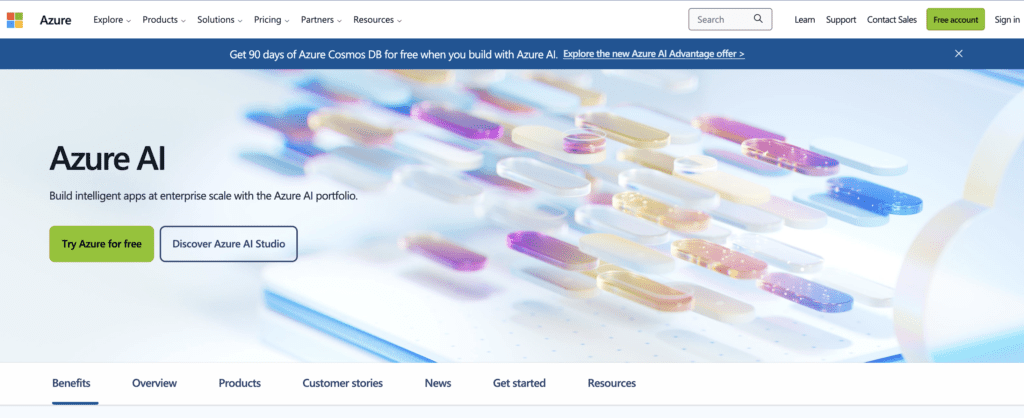
Microsoft Azure AI offers a comprehensive suite of AI tools and services, catering to various aspects of business application development, from machine learning to knowledge mining.
Target Audience: Developers and businesses seeking cloud-based AI solutions for scalable application development.
Key Features:
- A wide array of AI services including Azure Machine Learning, Cognitive Services, and Bot Services.
- Seamless integration with other Azure cloud services.
- Robust tools for building, training, and deploying AI models.
Pricing Model: Mostly pay-as-you-go, with different pricing for various services.
Pros:
- Comprehensive suite covering a wide range of AI applications.
- Strong integration capabilities within the Azure ecosystem.
- Scalable and secure, suitable for businesses of all sizes.
Cons:
- Can be complex to navigate due to the breadth of services.
- Cost can escalate with extensive usage.
Salesforce Einstein
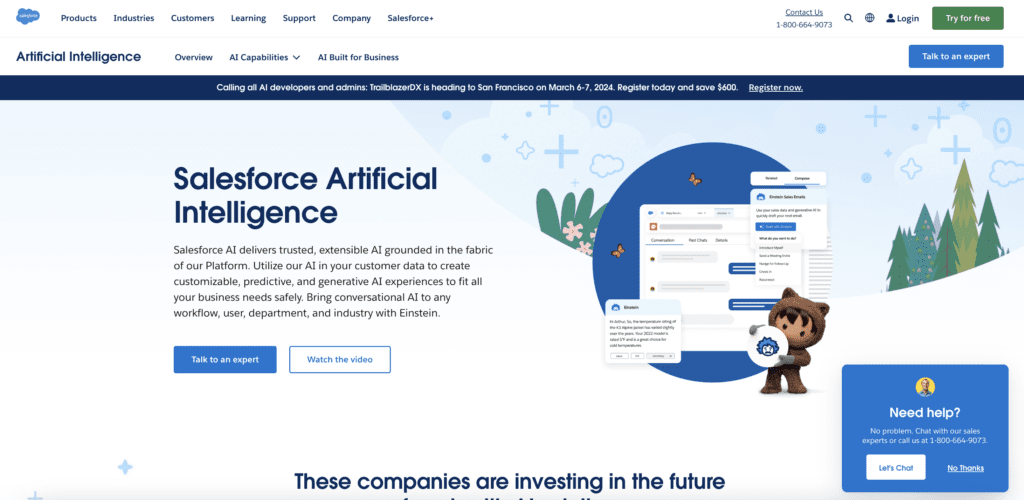
Salesforce Einstein is an AI layer integrated within the Salesforce platform, providing AI capabilities to enhance CRM and customer experience.
Target Audience: Existing Salesforce users and businesses looking to leverage AI for customer relationship management.
Key Features:
- AI-powered predictions and recommendations.
- Automated task management and customer insights.
- Seamless integration with the Salesforce ecosystem.
Pricing Model: Available as part of the Salesforce platform; pricing varies based on the Salesforce subscription plan.
Pros:
- Enhances CRM with intelligent insights and automation.
- Direct integration with Salesforce data.
- User-friendly for Salesforce users.
Cons:
- Primarily beneficial for businesses already using Salesforce.
- Limited utility outside the Salesforce environment.
Blue Prism
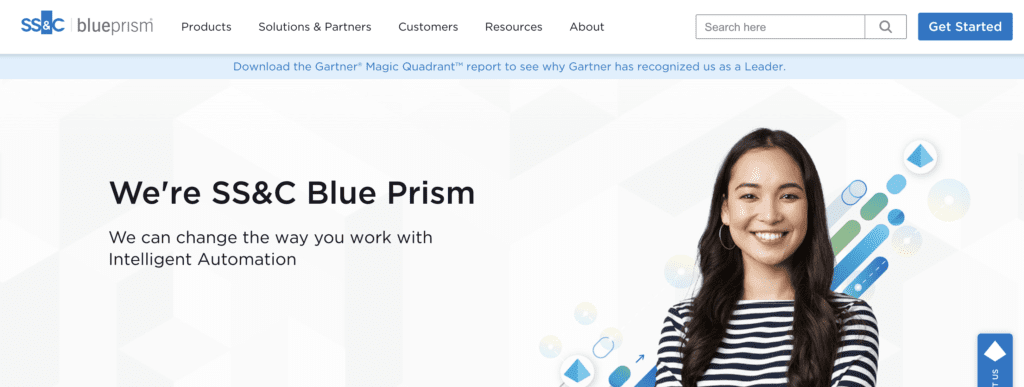
Blue Prism specializes in Robotic Process Automation (RPA), offering an AI-powered platform designed to automate complex business processes. It’s particularly effective in streamlining repetitive tasks, enabling businesses to focus on more strategic activities.
Target Audience: Enterprises looking to automate business processes and integrate AI for efficiency and accuracy.
Key Features:
- Robotic Process Automation (RPA) for automating routine business tasks.
- AI capabilities to enhance decision-making and process optimization.
- Scalable architecture is suitable for large-scale enterprise deployment.
Pricing Model: Primarily offers a subscription-based model, with pricing dependent on the scale and complexity of the deployment.
Pros:
- Streamlines and automates routine and complex processes, improving efficiency.
- Integrates AI for enhanced decision-making and process optimization.
- Scalable and secure, suitable for large enterprise environments.
Cons:
- Can be complex to implement, requiring a good understanding of existing processes.
- Higher initial investment, making it more suitable for larger organizations.
Summing Up
In this article, we’ve discussed the critical role of revolutionizing AI tools for business application development. I’ve highlighted the importance of customization, operational efficiency, advanced data analytics, and scalability. Key tools, such as Flatlogic, excel at delivering custom web application services that are tailored to meet specific business needs with AI enhancements.
For organizations looking to leverage AI to improve the efficiency and innovation of their applications, Flatlogic is an excellent choice. Their expertise in integrating AI into various aspects of business processes, from ERP to CMS systems, makes them the go-to company for organizations seeking future-proof solutions.
Comments